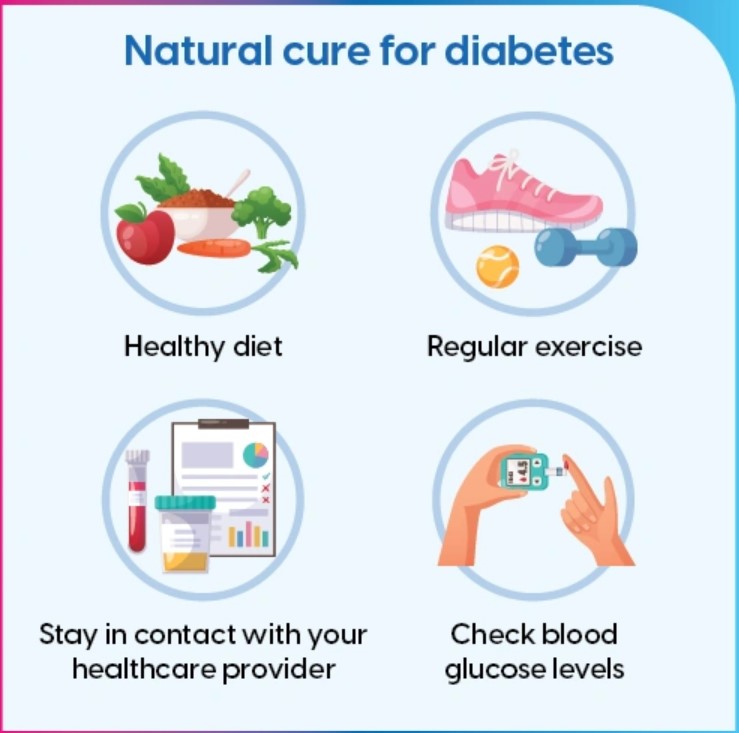How can I treat my diabetes?
Treating diabetes requires a combination of lifestyle changes, medical management, and regular monitoring to control blood sugar levels and prevent complications. Depending on the type of diabetes you have—Type 1, Type 2, or gestational diabetes—the approach may vary.
However, the overall goal is to maintain stable blood glucose levels within a healthy range.
General Guidelines for Treating Diabetes
Healthy Eating (Diabetes-Friendly Diet)
Your diet plays a critical role in managing diabetes. The key is to focus on balanced meals that control blood sugar while providing the necessary nutrients for good health.
- Limit Carbohydrates: Carbohydrates have the greatest impact on blood sugar. Focus on complex carbohydrates like whole grains, vegetables, and legumes, and avoid simple sugars found in candy, sugary drinks, and processed foods.
- Choose High-Fiber Foods: Fiber helps slow the absorption of sugar and improves blood sugar levels. Incorporate plenty of non-starchy vegetables (broccoli, spinach), fruits (berries, apples), and whole grains (oats, brown rice).
- Eat Lean Proteins: Protein doesn’t raise blood sugar levels and keeps you feeling full. Opt for lean meats (chicken, turkey), fish, eggs, and plant-based proteins like tofu, lentils, and beans.
- Healthy Fats: Include healthy fats from sources like avocados, olive oil, nuts, and seeds to improve cholesterol levels and heart health.
- Portion Control: Be mindful of portion sizes to avoid overeating, which can spike blood sugar levels. Smaller, more frequent meals are often recommended to maintain stable blood sugar levels.
- Limit Sugary Beverages: Stick to water, unsweetened teas, and sugar-free drinks. Avoid soda, sweetened coffee, and energy drinks that can cause blood sugar spikes.
Exercise Regularly
Physical activity helps your body use insulin more effectively and lowers blood sugar levels. Exercise can also help with weight management, which is particularly important for people with Type 2 diabetes.
- Aerobic Exercise: Aim for at least 150 minutes of moderate aerobic exercise (like brisk walking, cycling, swimming) per week.
- Strength Training: Incorporate resistance training (lifting weights, using resistance bands) at least 2-3 times a week to help build muscle, which improves insulin sensitivity.
- Stay Active Throughout the Day: Simple activities like walking, climbing stairs, and stretching can help manage blood sugar, especially after meals.
Monitor Blood Sugar Levels
Regular monitoring helps you understand how food, activity, and medications affect your blood sugar.
- Check Blood Sugar Regularly: Depending on your treatment plan, you may need to check your blood sugar multiple times a day. Tracking your levels helps you make informed decisions about food, activity, and medications.
- Target Blood Sugar Levels: Work with your healthcare provider to determine your target blood glucose range. Typically, a fasting blood sugar level of 80-130 mg/dL and less than 180 mg/dL two hours after eating is recommended for people with diabetes.
Take Medications as Prescribed
The type of medication you take will depend on your type of diabetes, overall health, and how well your body controls blood sugar.
- Type 1 Diabetes: Insulin is required because the body doesn’t produce insulin. There are different types of insulin (rapid-acting, long-acting), and it can be delivered via injection or insulin pumps.
- Type 2 Diabetes: Some people with Type 2 diabetes can control their blood sugar with diet and exercise alone, but many need medications or insulin. Common medications include:
- Metformin: Improves the body’s sensitivity to insulin and lowers sugar production in the liver.
- Sulfonylureas: Help the body produce more insulin.
- GLP-1 receptor agonists and SGLT2 inhibitors: Newer medications that improve blood sugar control and may have heart and kidney benefits.
- Insulin therapy: Some people with Type 2 diabetes may also require insulin.
Manage Stress
Chronic stress can raise blood sugar levels and interfere with diabetes management. Practice stress-reducing activities such as:
- Meditation and Deep Breathing: These can help calm the mind and lower stress hormone levels.
- Exercise: Physical activity, in addition to lowering blood sugar, can help reduce stress.
- Adequate Sleep: Aim for 7-9 hours of good-quality sleep each night. Poor sleep can negatively affect blood sugar control and increase stress.
Stay Hydrated
Drinking water helps your kidneys flush out excess sugar through urine. Aim to drink 8-10 glasses of water a day, and avoid sugary or high-calorie drinks.
Weight Management
For people with Type 2 diabetes, losing even a small amount of weight (5-10% of body weight) can improve insulin sensitivity and help control blood sugar.
- Focus on gradual weight loss through a combination of a healthy diet and exercise.
Foot Care
Diabetes can cause poor circulation and nerve damage, leading to foot problems. Proper foot care is crucial:
- Inspect Your Feet Daily: Look for cuts, blisters, or swelling.
- Wear Comfortable Shoes: Choose footwear that supports your feet and avoid walking barefoot.
- Keep Feet Clean and Dry: Wash your feet daily and dry them well, especially between the toes.
Quit Smoking
Smoking raises blood sugar levels, damages blood vessels, and increases the risk of heart disease and stroke, which are common complications of diabetes. Quitting smoking can improve your overall health and blood sugar control.
Routine Medical Checkups
- Regular A1C Tests: These measure your average blood sugar over the past 2-3 months. Aim to keep your A1C below 7%, or as recommended by your healthcare provider.
- Check for Complications: Diabetes can lead to complications like heart disease, kidney problems, vision loss, and nerve damage. Regular checkups with your doctor, eye exams, and screenings for kidney function are essential.
